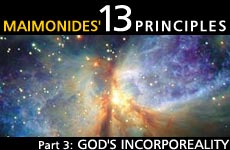 Vampire Weekend's Surprising Jewish Stories
Vampire Weekend's Surprising Jewish Stories


5 min read
If one believes that God is physical, inevitably he will feel capable of escaping Him.
Based on a series of lectures by Rabbi Yaakov Weinberg, of blessed memory.
We believe that this Oneness is neither a body nor a bodily force, nor is He subject to any bodily characteristics -- movement, rest, or dwelling -- be they inherent or by chance. Therefore the Sages repudiated [the possibility of any] cohesion or separation [concerning Him], as they said: "Above there is no sitting, standing, division, or ‘cohesion'" (a usage based on Isaiah 11:14). As the prophet (ibid., 40:18-25) said: "Who is comparable to the Almighty...?" For if He had a body, He could be compared to other bodies.
All the corporeal terms used in the Scriptures to describe Him -- such as walking, standing, sitting, speaking etc. -- are metaphorical. As the Sages have said: "The Torah speaks in the language of man."
This is the third Principle, as affirmed by the verse (Deuteronomy 4:15) "You have not seen any image," that is to say, you cannot conceive of Him as having any form because, as stated, He is neither a body nor a bodily force.
-- Maimonides, 13 Principles of Faith
It is necessary to understand and be aware of God's incorporeality because if God occupied space, man could be free of Him. If God occupied space, He would be limited and He would have boundaries. A physical being cannot be in two places at the same time. If the Almighty were limited in space, then man could elude His awareness. If man could elude His awareness, then God could no longer tell humanity how to act. When an individual felt like doing something wrong, he could make sure that it was dark, that he was hidden, and that he had thus escaped, smug in his confidence that God would never find out.
If one believes that God is physical, he will feel capable of escaping Him. One need not intellectually follow this logical reasoning to reach this conclusion: a human being will naturally act out the logical consequences of the concepts he believes. A man does not have to be a philosopher in order to realize these logical consequences. Without considering, he instinctively reacts from the position of his beliefs. If he takes the position that God is corporeal, that He occupies space, then he will intuitively conclude that he can hide from Him.
The Raavad (Rambam, Mishneh Torah, Laws of Repentance 3:7) disagrees with the ramification of believing that God is corporeal. He believes that man can avoid the logical consequences of his beliefs. If an individual believes that God is corporeal, he is making a significant mistake, but he can still relate to the Almighty and still be bound by His Torah. He may not feel able to escape God, even though this feeling is the logical consequences of his belief.
Although the concept of God's incorporeality is generally understood, the parallel concept of His non-spirituality is not well known. Although God is frequently referred to as a spiritual Being, we apply the term loosely for lack of another word. If a material object is defined as being confined to time and space, while something spiritual is confined in terms of time but not in terms of space, then it must be concluded that God is neither physical nor spiritual. The Almighty is confined neither in space nor in time. All material and spiritual beings were created by Him, as it is written (Genesis 1:1): "In the beginning God created the heavens and the earth."
God is , neither physical nor spiritual, the Creator of both the physical and the spiritual worlds.
Our Sages learned that "the heavens" is a reference to spiritual creations, such as the angels and the "Throne of Honor," while "the earth" refers to all material existence. The souls of human beings, also spiritual entities, were likewise created. Thus, it is incorrect to describe God in spiritual terms. He is , neither physical nor spiritual, the Creator of both the physical and the spiritual worlds.
The verse which the Rambam cites as proof of God's incorporeality can also be applied to His non-spirituality. He quotes the prophet Isaiah (Isaiah 40:18,25): "Who is comparable to the Almighty?" If God were material, He could be compared to everything material in creation. In the same manner, if He were spiritual, then He could be compared to anything spiritual in creation. Neither comparison can be made, for there is no relationship of any kind that could describe His being the Creator. We can understand Him only in terms of the Creator-creation relationship.
Yet the Rambam's third Principle deals only with God's incorporeality. Why doesn't it include the aspect of His non-spirituality? What is the difference between the significance of His incorporeality and the significance of His non-spirituality?
As we have defined the Rambam's conception of the Principles, the answer to this question depends on whether lack of awareness of God's non-spirituality may actually preclude one's serving Him. As has been discussed, the Thirteen Principles are the fundamental concepts which are absolutely essential in order for man to relate correctly to the Almighty and His Torah.
As mentioned earlier, one who perceives God as a corporeal entity, limited in time and space, can and will ultimately feel that He can be avoided. The consequence of this error translates into the belief that man is not bound by the Torah. The lack of awareness of God's non-spirituality, on the other hand, does not bear similar consequences. His being spiritual or not does not affect our orientation in terms of being able to escape Him or serve Him. Because our orientation is not affected, the issue of spirituality is not included in this Principle.
This article is an excerpt from "Fundamentals and Faith: Insights into the Rambam's 13 Principles" by Rabbi Mordechai Blumenfeld.
